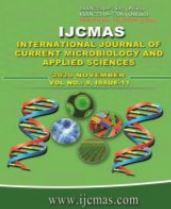


 National Academy of Agricultural Sciences (NAAS)
National Academy of Agricultural Sciences (NAAS)

|
PRINT ISSN : 2319-7692
Online ISSN : 2319-7706 Issues : 12 per year Publisher : Excellent Publishers Email : editorijcmas@gmail.com / submit@ijcmas.com Editor-in-chief: Dr.M.Prakash Index Copernicus ICV 2018: 95.39 NAAS RATING 2020: 5.38 |
Plants produce a spacious range of biologically active molecules which have antagonistic properties against plant parasitic nematodes. The peroxidase (PO), polyphenol oxidase (PPO), phenylalanine ammonia lyase (PAL) and superoxide dismutase (SOD) are the most defense enzymes produce by plants during nematode infection. An experiment was conducted to assess the response of defence enzymes PO, PPO, PAL and SOD in tomato roots when treated with oil cakes (castor, mahua, karanj and mustard @ 2.5 and 5.0 q/ha and neem cake @ 5.0 q/ha as a standard check) against M. incognita. The enzymatic activity was assayed in tomato roots and results revealed that application of oil-cakes increased the level of defense enzymes with exposure of time. Among all, the application of mustard cake @ 5.0 q/ha was found best to enhance enzymatic activity from 7 days after inoculation onwards to 28 DAI as compared to untreated check. The lowest enzyme activity in among enzymes was recorded at 60 DAI in untreated control plant roots. Among enzymes the PO was found highest followed by SOD during different time of observations, while PPO and PAL were observed in low quantity. As regard to nematode reproduction, mustard cake @ 5.0 q/ha soil proved best treatment followed by castor and mahua @ 5.0 q/ha. However, standard check neem cake @ 5.0 q/ha was found the best treatment to increasing enzymatic activity, improving plant growth characters as well as in reducing nematode population over other treatment.
 |
 |
 |
 |
 |